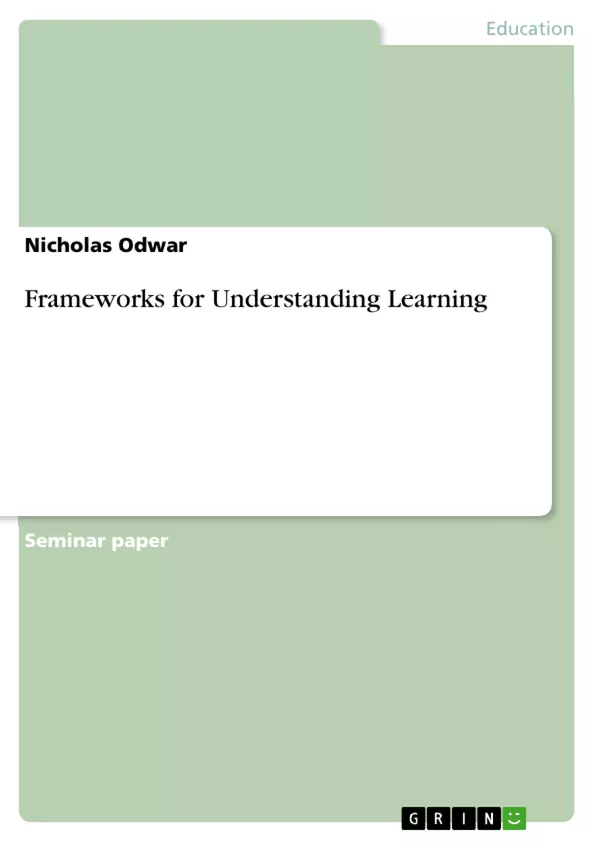Teaching and learning frameworks describe the research-informed representations for course strategy that allow instructors bring into line learning objectives with classroom actions, develop inspiring and comprehensive environments, and incorporate valuation into learning. Learning frameworks are essential in the sense that they offer a mechanism for bring into line activities in educational experiences in order for them to develop toward a plainly described end or goal. This essay aims to discuss two significant learning frameworks as well as compare the frameworks, apply the key concepts of the frameworks to a learning situation and generally examine the frameworks in overall and specific implementation. The two frameworks chosen for this essay include “Behaviorism” and “Constructivism.” Behaviorism is a learning framework which infers that all behaviors are acquired as a result of interacting with the surroundings. Particularly, it infers that conducts are learned from the environment and that inborn or inherited aspects possess very slight effect on behavior. There are numerous concepts or theories within the “Behaviorism” namely, “classical conditioning” and “operant conditioning.” “Classical conditioning” suggests that conducts are acquired by connecting a neutral incentive with a positive one; the obtained conduct is marked a conditioned reaction. It generally involves making a link between two stimuli, leading to a learned reaction. “Operant conditioning” is a learning procedure that integrates rewards and punishment to adjust conduct.
Inhaltsverzeichnis (Table of Contents)
- Introduction
- Framework One: Behaviourism Learning framework
- Classical Conditioning
- Operant Conditioning
- External Factors
- Framework Two: Constructivism Learning framework
Zielsetzung und Themenschwerpunkte (Objectives and Key Themes)
This write-up focuses on behaviourism and constructivism, detailing their key theoretical principles and concepts and how they generally apply and explain learning based on a provided scenario. The overall purpose is to explain how each of the learning frameworks explains learning by critically analysing their benefits, criticism, and overall applicability.
- Behaviourism as a Learning Framework
- Constructivism as a Learning Framework
- Comparing and Contrasting Behaviourism and Constructivism
- The Role of Environmental Stimuli in Learning
- The Importance of Active Learning and Problem-Solving
Zusammenfassung der Kapitel (Chapter Summaries)
The introduction provides a brief overview of learning frameworks, emphasizing their role in clarifying the learning process and aiding educators in adapting their teaching techniques for improved outcomes. The paper focuses on behaviourism and constructivism, exploring their theoretical principles and practical applications in a real-world scenario.
The first chapter delves into the behaviourism learning framework, tracing its origins to the early 20th century and highlighting its emphasis on environmental stimuli and consequences in shaping behaviour. The chapter explores key theoretical underpinnings such as classical and operant conditioning, detailing how these concepts contribute to the understanding of learning. The chapter also examines the advantages of behaviourism in classroom settings, such as its structured approach to learning and its emphasis on clear expectations. However, it also acknowledges criticisms levelled against behaviourism, including its limitations in addressing cognitive processes and its tendency to overlook the role of internal factors in learning.
The second chapter introduces the constructivism learning framework, emphasizing its key tenet that learners actively construct their knowledge through experiences and reflection. The chapter underscores the role of prior experiences, cultural beliefs, and social influences in shaping learners' understanding of the world. It also highlights the importance of active learning, problem-solving, and the development of learner autonomy in constructivist approaches to education.
Schlüsselwörter (Keywords)
The main keywords and focus topics of this text are: learning frameworks, behaviourism, constructivism, classical conditioning, operant conditioning, environmental stimuli, consequences, cognitive processes, active learning, problem-solving, schemas, prior experience, cultural beliefs, and social influences.
- Arbeit zitieren
- Nicholas Odwar (Autor:in), 2024, Frameworks for Understanding Learning, München, GRIN Verlag, https://www.hausarbeiten.de/document/1487277


